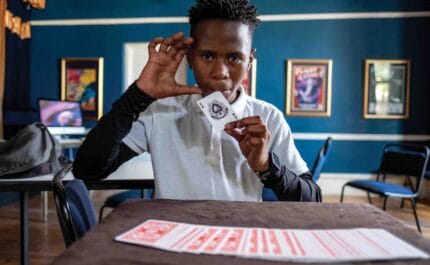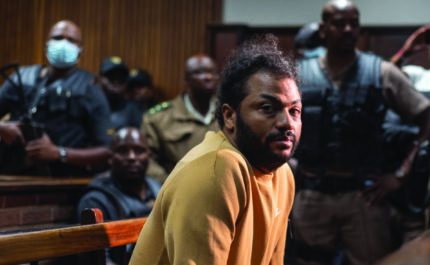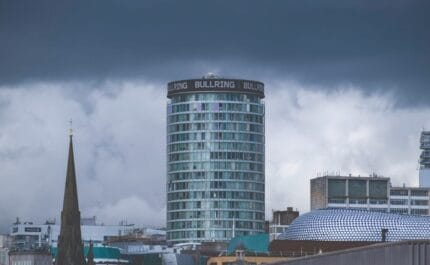Pyongyang rocks
As cross-border tensions escalated on the Korean peninsula, Slovenian "avant-garde neoclassical dark wave" band Laibach took to the stage in North Korea. Marcus Webb talked to the musicians and crew about their most unlikely tour
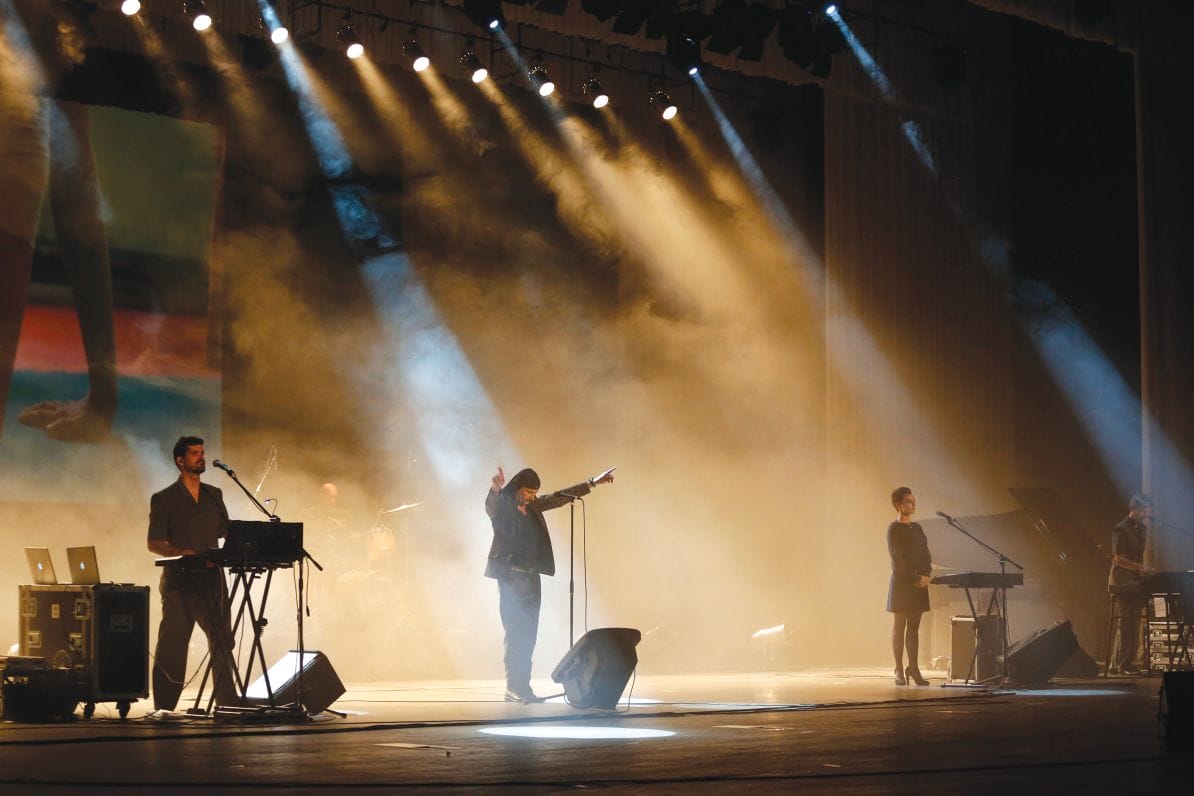
Photo: Dita Alangkara/AP/Press Association Images
20th August 2015 (Taken from: #20)
Clad in grey military-style uniforms, the band members dominate the stage, stomping, strumming and screaming their way through their song The Final Countdown. As the final note rings out around the Ponghwa Theatre the band waits, expectantly, for the reaction.
A gentle ripple of applause patters around the auditorium. The crowd goes… mild. “They reacted politely,” remembers band member Ivo Saliger. “It was probably the same way they would applaud at the opera.” The reception might have been muted, but the audience had just witnessed a piece of rock ’n’ roll history. Laibach had just become the latest foreign rock band to play the Democratic People’s Republic of Korea.
At first glance Laibach seems an unlikely choice to introduce the DPRK to the joys of rock ‘n’ roll. An experimental collective from Slovenia, the band formed in 1980 and has attracted controversy ever since. The band adopts fascist uniforms (ironically, they claim) while working with anti-hate groups, sings songs of female empowerment while hardcore pornography is screened behind them, and detests simplistic descriptions of its music – which has been labelled as martial, industrial and “avant-garde neoclassical dark wave”. Nobody in the band uses their real name, instead adopting one of a number of rotating aliases. The band is nobody’s idea of a nation’s gentle introduction to rock: this is not The Eagles goes East. “We don’t really know why they chose us and I don’t believe they knew either,” says Saliger with a grin. “[Musical director] Morten Traavik successfully convinced them that Laibach is the right thing for them, if for nothing else, because we are usually as misunderstood as the [North Koreans] are.”
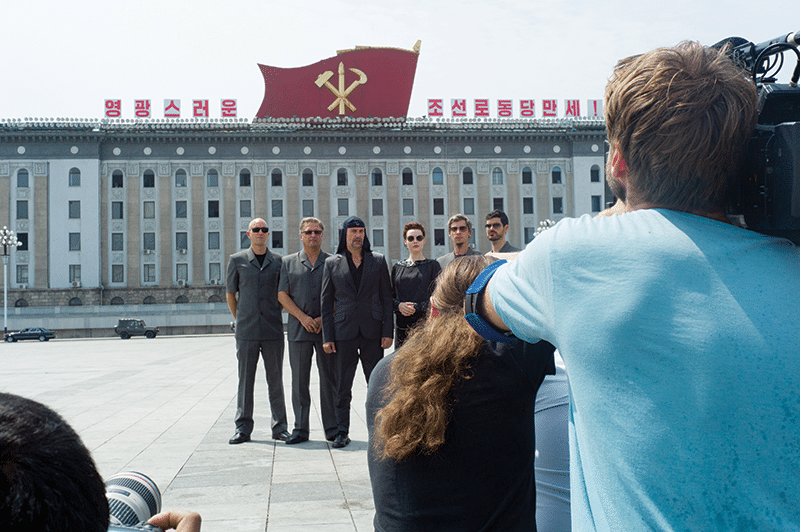
Members of Laibach pose in a square in central Pyongyang. Photo: Daniel Miller
Traavik is as tough a character to pigeonhole as the band he took to North Korea. The Norwegian “multipraktik” artist is responsible for Miss Landmine (a competition to find “Angola’s loveliest landmine victim”), Hærwerk (a series of military installations in collaboration with the Norwegian armed forces which included putting a giant condom on a US nuclear missile), and a music video of a North Korean accordion band playing a cover of A-Ha’s Take On Me. This last project, an unlikely viral hit with nearly 2.5 million views on YouTube, led to Traavik’s most ambitious undertaking yet – bringing Laibach, who have been described as “the most dangerous band in the world” to a country dubbed “the most dangerous place on earth”.
Despite the country’s fearsome reputation there was no hesitation from the band about signing up. “Did we ever consider saying no? Of course not,” asserts Saliger. “Partly because we did not really believe that we could get in. And when it became clear that we were actually doing it – and especially when we were attacked from all sides for doing it [there was a large media backlash against the band when their plans to visit North Korea were announced] – there was no hesitation left at all.”
What could commemorate throwing off the yoke of Japanese occupation better than two hours of Slovenian avant-garde neoclassical dark wave?”
Two years of negotiations between DPRK’s cultural exchange committee and Traavik followed. In the end it was the 70th anniversary of the Korean peninsula’s liberation from Japanese colonisation that brought the project to fruition. The DPRK wanted to mark the event – and what could commemorate throwing off the yoke of Japanese occupation better than two hours of Slovenian avant-garde neoclassical dark wave? The decision was made and Laibach and its 26-strong crew were on their way.
It took Laibach and its entourage the best part of 24 hours to reach North Korea and there was little time to recover from the journey. The band was whisked straight from the airport to technical rehearsals and from there to an official dinner. “We had to do several toasts to ourselves and to our hosts,” says Saliger. “Finally we ended up in a hotel bar, where we had to continue with toasting until the early hours.” “The Koreans are quite into drinking, and so are the Slovenians,” observes Daniel Miller, head of the band’s record label Mute, who joined the tour as a roadie-cum-photographer. “So there was quite a lot of bonding there.”
Unbeknownst to the band, while the eumjugamu (good times) rolled, relations between the DPRK and its southern neighbour were deteriorating rapidly. Two weeks before the band arrived, a landmine in the demilitarised zone (DMZ) between the two countries had exploded, injuring two South Korean soldiers. The country responded by broadcasting anti-Kim propaganda over the border. When Seoul refused to heed Pyongyang’s demands to stop, things escalated quickly: as Laibach was checking into its hotel, Kim Jong-un was accusing the South of being “war maniacs” while mobilising his country’s submarines and ordering its troops onto a war footing.
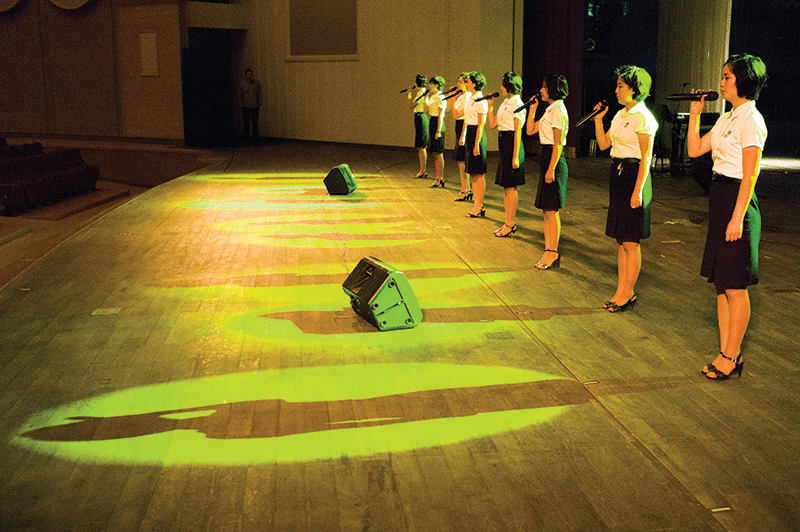
Rehearsals saw a choir from the Kum Song music school practising to accompany Laibach. Photo: Daniel Miller
The two nations seemed on the brink of armed conflict, yet the Laibach crew was blissfully unaware. “You don’t have much communication,” says Miller. “It is possible to go online but it is very expensive and most of the news sites are blocked.” At the height of the confrontation the band was actually taking a tour of the DMZ, but was none the wiser. “We couldn’t see or feel any special activity going on,” says Saliger.
The majority of the programme would be based on our versions of songs from The Sound of Music, which is one of the few American films North Koreans are allowed to watch”
The dogs of war might have been straining at the leash, but Team Laibach had its own problems to deal with. “There were two days of rehearsals in Pyongyang, and there was quite a lot of editing and censorship,” says Miller. “There are two options with North Korea – you either embrace the process and make the most of it, or you don’t go. Personally, I think not to have gone because of censorship would have been an extremely bad decision. If Laibach get 10 percent of their show across that’s still 100 percent more than anyone in the audience could have imagined.” Still, some of the censor’s suggestions left the band on the back foot. “There was a point during rehearsals when Milan [Fras], the lead male vocalist, began to sing,” says Miller. “The leader of the censorship committee raised his hand and the band stopped.”
The official politely asked if it would be possible if Milan could “not do that during the concert.”
“What?” asked the band.
“Sing,” he replied. “It might scare people.”
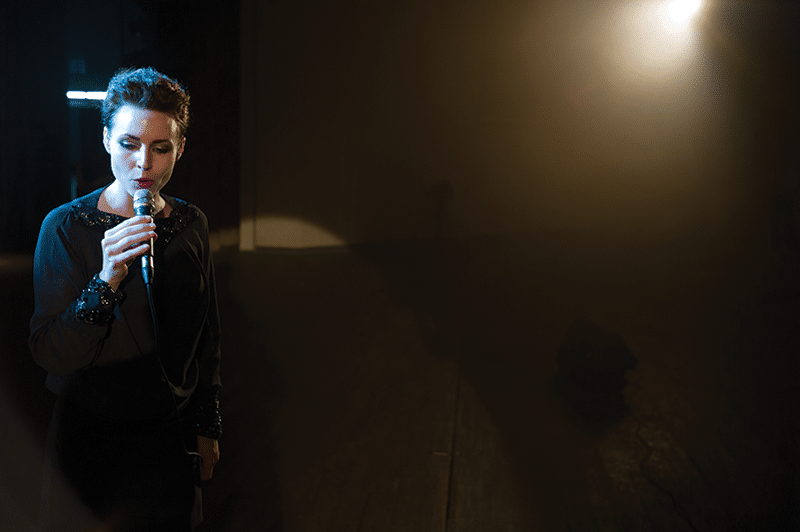
Mina Spilner on stage in North Korea. Photo: Daniel Miller
Once they’d dialed down their vocal scariness, Laibach concentrated on getting clearance for their secret weapon – Julie Andrews. “We wanted to perform something that would possibly make sense to North Koreans,” says Saliger. “So we decided that the majority of the programme would be based on our versions of songs from The Sound of Music, which is one of the few Western films North Koreans are allowed to watch. They use it to learn English and they have their own Korean versions of the songs. The Sound of Music story fits into the North Korean situation and can be understood affirmatively, but also subversively.”
At the end of the show they did give us a standing ovation, but maybe they were just happy that it was over”
With the set list approved, the band and crew had time to kill before the opening gig, but their plans to explore Pyongyang were limited by constant chaperoning. “I found the first few days very claustrophobic,” says Miller. “My first instinct, as it would be in any new place, was to go for a walk and see what’s around. But you couldn’t leave the hotel without a guide. Soon, though, it felt very natural to be there in a very restricted society. The DPRK has been going for four generations since the end of WWII, the Kim dynasty is all that most people know. The rules are strict, but you don’t see a military or police presence on the streets. Respecting the rules seems so ingrained into the people’s DNA, that they don’t need people to enforce it. It is like you don’t see tanks on the streets of London enforcing democracy.”
While Miller was being escorted around the city, Saliger, ever the rebel, had managed to escape into the city on his own. “I managed to sneak out from the hotel and go for a walk in the city without any Korean guide,” he remembers. “Just a simple walk through the city park, mingling with Korean people on the street, that was the most memorable moment in Pyongyang – beside the concerts, of course.”
Apart from the underwhelming applause, Laibach’s first concert passed off well. The day of the band’s second concert, meanwhile, saw the first exchange of gunfire between North and South Korea in 18 months. The DPRK fired a shell into the county of Yeoncheon, and South Korea launched several artillery rounds in response. But in the Kum Song Music School the band, totally oblivious, played on, segueing from Laibach hits Life is Life and The Final Countdown into reworked versions of Korean folk standards and pop songs via Rodgers and Hammerstein’s finest.
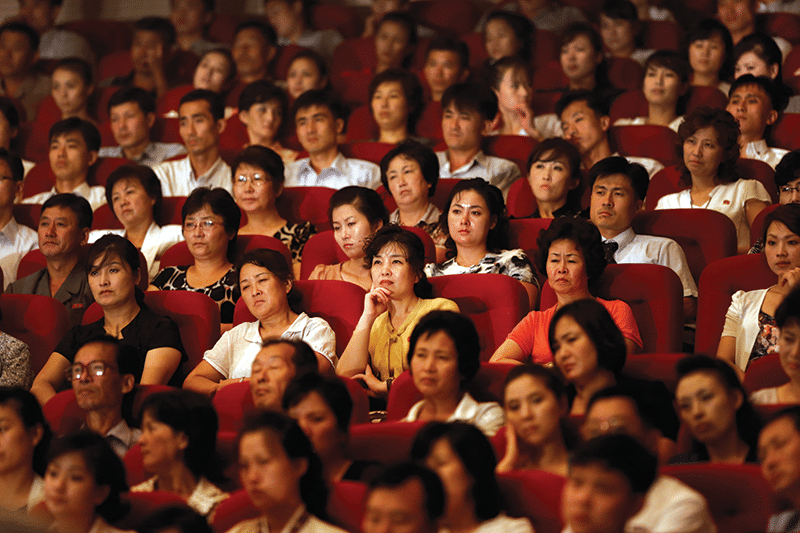
The audience at Laibach’s concert soak up the spectacle. Photo: Dita Alangkara/AP/Press Association Images
“At the end of the show they did give us a standing ovation, but maybe they were just happy that it was over,” says Saliger, laughing. “The Syrian ambassador certainly didn’t like the show much. He said that it was ‘too loud – almost like torture’.” An elderly Korean member of the audience gave them their best review. “I didn’t know that such music existed in the world,” he said. “Now I know.”
The feedback may not have been ecstatic, but history had been made. Laibach had rocked North Korea. Meanwhile, four days of intense peace talks in the border truce village of Panmunjom resulted in Pyongyang expressing regret over the serious injuries caused by the landmine blasts and Seoul agreeing to halt the propaganda pumped out by loudspeakers. The prospect of armed conflict between the two Koreas was quelled – for now.
Back home, Miller looks back on the gigs with bemusement. “Whenever I talk to anyone who was on the tour I ask ‘Did we go to North Korea or did we go to somewhere that said it was North Korea?’ We could have been on the Hollywood film lot where they filmed the moon landings for all I know. That’s the lasting impression: did we really go? Or did it just say North Korea on the packaging?”
Saliger has found the reaction from people on his return to be a mix of “curiosity, suspicion, admiration and some good old moralisation”. And with hindsight, what does he think the North Koreans made of it all? He pauses for reflection before answering. “They will probably think twice before they invite more rock bands into the country,” he says.
Slow Journalism in your inbox, plus infographics, offers and more: sign up for the free DG newsletter. Sign me up
Thanks for signing up.
